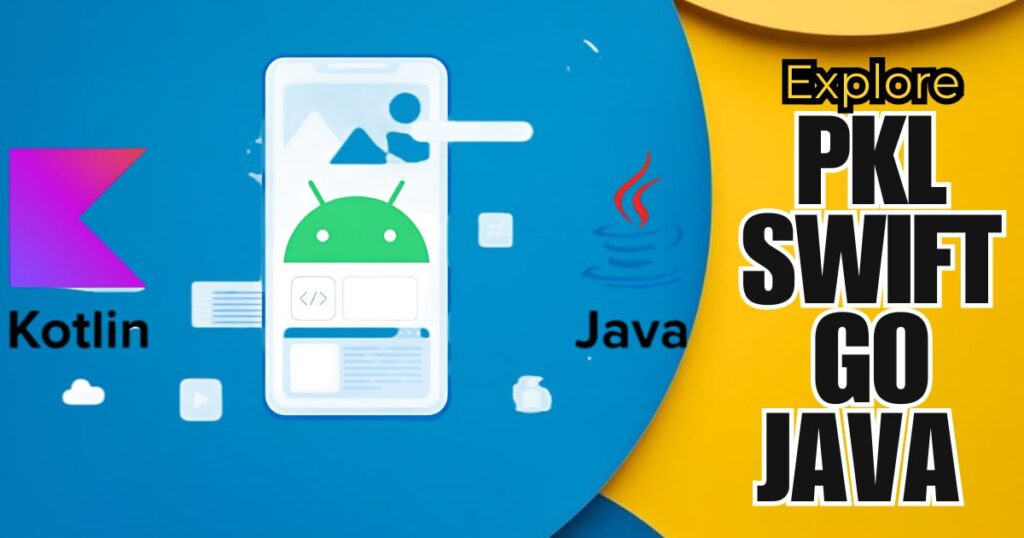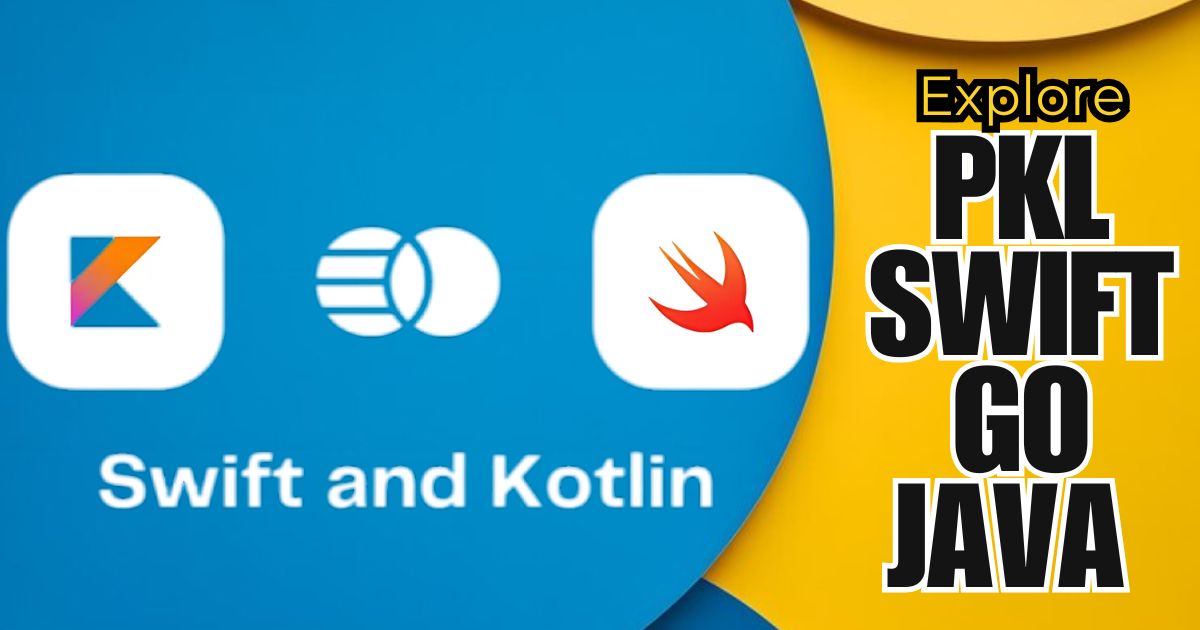In today’s fast-paced world of software development, choosing the right programming language for your project is critical. With so many programming languages to choose from, it can be overwhelming to navigate through the options.
In this article, we’ll dive into an in-depth comparison of PKL Swift Go Java KotlinBlog, four of the leading languages for modern development.
Whether you’re building iOS apps, backend services, enterprise solutions, or mobile development projects, understanding these languages’ strengths, weaknesses, and use cases will help you make an informed decision.
Swift in PKL Swift Go Java KotlinBlog: Leading Choice for iOS Development
When it comes to iOS development, Swift programming language stands as the clear leader. Developed by Apple, Swift was designed to be an easy-to-learn yet powerful alternative to Objective-C for creating macOS apps and iPhone coding.
Key Features of Swift:
- Optimized for iOS Development: Swift was built from the ground up to work seamlessly with Apple’s ecosystem, making it the preferred language for mobile development on iPhone, iPad, and other Apple devices.
- Simplified Syntax: One of Swift’s most praised aspects is its concise and easy-to-read syntax, making it a favorite among both new and seasoned developers. Unlike other languages, Swift reduces boilerplate code, improving productivity.
- Performance: Swift is faster than its predecessors like Objective-C, offering a significant performance boost in areas such as memory management and execution speed.
Swift has quickly become the language of choice for developers looking to build high-performance, feature-rich applications for Apple devices.
Go (Golang) in PKL Swift Go Java KotlinBlog: Concurrency and Efficiency at Scale
Next up is Go programming language, commonly known as Golang. Developed by Google, Go has gained widespread popularity in recent years, especially for building backend services and microservices.
What sets Go apart is its focus on concurrency, which is the ability to perform many tasks simultaneously.
Key Features of Go:
- Concurrency in Go: Go’s built-in support for goroutines and channels makes it an ideal choice for applications requiring high levels of concurrency, such as web servers and real-time applications.
- Simplicity and Speed: Go’s design emphasizes simplicity in syntax, which, combined with its fast execution, makes it a top choice for building scalable, high-performance applications.
- Perfect for Backend Development: Go excels at handling complex backend services, providing tools for network programming and handling vast amounts of traffic.
In terms of backend services, Go’s efficient concurrency model makes it a preferred choice for large-scale applications that require fast, concurrent processing. Companies like Dropbox, Uber, and many others use Go to build powerful, scalable systems.
Java in PKL Swift Go Java KotlinBlog: The Enterprise Standard
For over two decades, Java programming language has been a dominant force in the world of software development, particularly in enterprise solutions.
Java enterprise solutions are widely recognized for their scalability, security, and ability to run on virtually any system thanks to the Java Virtual Machine (JVM).
Key Features of Java:
- Cross-Platform Compatibility: Java’s JVM portability allows developers to write code once and run it anywhere, making it highly adaptable for cross-platform development. Whether on Windows, Linux, or macOS, Java works seamlessly.
- Enterprise Strengths: Java powers many of the world’s most critical applications, from banking systems to cloud platforms. Its maturity, security, and robust framework ecosystem make it the go-to choice for enterprise-grade applications.
- Extensive Libraries and Frameworks: Java’s vast selection of libraries, frameworks, and tools (such as Spring and Hibernate) makes it easy to create complex applications for any industry.
Although newer languages like Kotlin are emerging, Java Android development continues to thrive, especially in enterprise solutions where stability, performance, and security are essential.
Kotlin in PKL Swift Go Java KotlinBlog: A Modern Alternative to Java

Kotlin programming language, developed by JetBrains, offers a more modern, concise, and expressive alternative to Java.
Kotlin is gaining ground quickly in the world of Android development, thanks to its interoperability with Java and improved syntax.
Key Features of Kotlin:
- Interoperability with Java: Kotlin is fully compatible with Java, meaning developers can use Java libraries and frameworks alongside Kotlin code. This allows for a smoother transition for teams already working with Java.
- Android Development with Kotlin: Kotlin offers null safety, concise syntax, and powerful features, making it a favorite for building Android apps. It reduces common coding pitfalls, such as null pointer exceptions, while making the codebase cleaner and more maintainable.
- Multi-Platform Support: Kotlin isn’t just for Android. Developers can use Kotlin to build cross-platform applications, including backend services, macOS apps, and even web applications.
In terms of Kotlin for Android, JetBrains has positioned the language as the modern, more efficient alternative to Java, driving its widespread adoption by developers.
Comparative Analysis in PKL Swift Go Java KotlinBlog
To make an informed choice, let’s dive deeper into the modern programming comparison between Swift, Go, Java, and Kotlin based on various factors.
| Feature | Swift | Go (Golang) | Java | Kotlin |
| Performance | Fast execution | High performance | Good, but slower | Comparable to Java |
| Learning Curve | Easy-to-learn syntax | Simple and fast | Steep learning curve | Easy to learn |
| Concurrency | Limited | Excellent | Poor (without extra tools) | Better than Java |
| Cross-Platform | Limited (Apple-only) | Excellent | Excellent (JVM) | Excellent (Multi-platform) |
| Community & Libraries | Growing | Growing | Extensive | Growing rapidly |
Choosing the Right Language with PKL Swift Go Java KotlinBlog
Choosing the right language depends on your project’s requirements. Here are a few factors to consider:
- Type of Application: Are you building an iOS app? Swift is your best bet. If it’s an Android app, Kotlin shines. For backend services with high concurrency, Go is ideal. For large-scale enterprise systems, Java is unbeatable.
- Team Experience: If your team is already skilled in Java enterprise solutions or Android development with Kotlin, it may be easier to stick with what you know.
- Cross-Platform Needs: If you need a language that works across platforms, Kotlin and Java are both great choices, with Kotlin leading in multi-platform development.
Conclusion
In conclusion, PKL Swift Go Java KotlinBlog covers four of the most important languages in modern development. Each language excels in different domains: Swift for iOS development, Go for backend services, Java for enterprise solutions, and Kotlin for Android apps.
Understanding the strengths and weaknesses of each language will allow you to choose the best tool for your project. Whether you’re building a mobile app, cloud service, or enterprise solution, there’s a programming language tailored to your needs.
No matter where you are in your development journey, make sure to consider these languages based on your project’s scale, performance requirements, and team expertise.

Taylor Swift is the founder and lead writer behind the independent blog genrealpro.com










